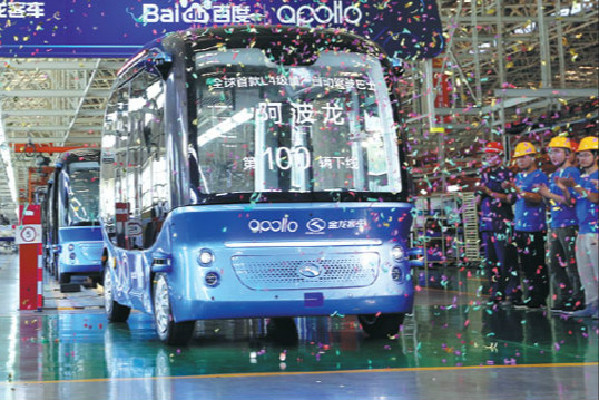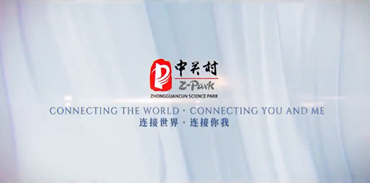Baidu buses stepping up a gear
 |
|
Apolong buses coming off the production line in Xiamen, Fujian province. Chen Bingqing / For China Daily |
Chinese internet search giant Baidu Inc announced on Wednesday it has begun volume production of Apolong, China's first fully autonomous mini bus, in partnership with Chinese bus manufacturer King Long, and intends to ship such buses to Japan early next year.
Apolong, which can seat 14 people, will be put into commercial operation in several Chinese areas, including Beijing, Shenzhen, Xiongan New Area, Wuhan, and Pingtan in Fujian province, Baidu said.
The production volume of Apolong has reached 100 units at its manufacturing facility in Xiamen, Fujian province, said Robin Li, Baidu's chairman and chief executive, at Baidu Create 2018, the company's annual developers' conference in Beijing.
Baidu also has teamed up with SB Drive, the autonomous driving subsidiary of Japan's SoftBank Group, to bring Apolong autonomous mini buses to Japan for operation in cities such as Tokyo early next year. The buses will be used for picking up employees from nuclear power stations as well as elderly people at communities in Japan, it said.
"This year marks the first year of commercialization for autonomous driving. From the volume production of Apolong, we can truly see that autonomous driving is making great strides," Li said.
Apolong, which is outfitted with Baidu's Apollo autonomous driving system, can complete self-driving operations such as obstacle avoidance, swerving and automatic transshipment. The buses will initially be put to use in last-mile travel scenarios such as tourist spots, airports and other enclosed areas.
The tech giant also unveiled on Wednesday the artificial intelligence chip Kunlun, which can be built to accommodate the high performance requirements of a wide variety of AI scenarios, such as data centers, public clouds and autonomous vehicles.
China expects vehicles with some autonomous functions to account for half of new vehicles sold in the nation by 2020, according to a guideline released by the National Development and Reform Commission.
Local authorities in Beijing released the country's first guideline on road tests of autonomous vehicles last December, and unveiled a closed testing ground for autonomous cars in February.
Zeng Zhiling, managing director of LMC Automotive Consulting Co, is bullish on the application of self-driving technologies in public transportation as the operating routes of buses are relatively fixed and less personal privacy issues will be involved.
"The reason why Baidu chose to export its Apolong mini bus to Japan lies in the fact that Japan is now facing population aging and a labor shortage, and the self-driving technology will solve these problems," said Zeng.
However, Zeng said it will still take two to three years to realize the large-scale commercial use of autonomous vehicles due to safety concerns.
Baidu is not alone in the field of autonomous driving. Tencent Holdings Ltd received its first license from Shenzhen municipal government to test intelligent connected vehicles on designated roads in May, and SAIC Motor Corp Ltd has inked a deal with Intel Corp to develop its self-driving cars.
fanfeifei@chinadaily.com.cn

